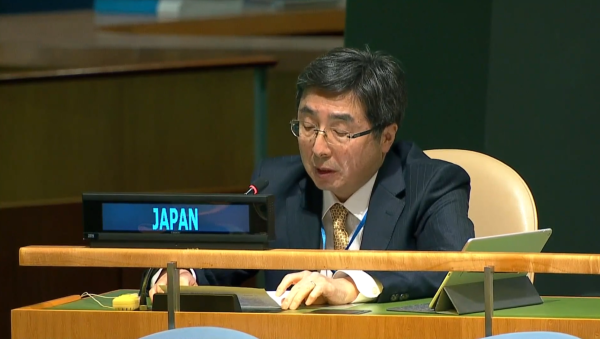コモン・アジェンダに関するテーマ協議第一回会合における石兼大使ステートメント
令和4年2月10日

(As delivered)
Mr. President,
Thank you for organizing a series of meetings to consider “Our Common Agenda (OCA)” report. I also thank the Secretary-General for sharing his time and thought with us. It provides an invaluable opportunity not only for the Member States but also for the Secretariat and the General Assembly to work in tandem to upgrade the United Nations.
Let me start by citing two key words in the OCA report: “solidarity” and “trust.” Solidarity underpinned by trust, across people and between people and institutions, would be the essential enabler of the report’s recommendations, if they were to be realized.
On Tuesday this week, UNDP launched a special report “New threats to human security in the Anthropocene” with the subtitle “Demanding greater solidarity.” The report proposes adding “solidarity” to the traditional human security framework of “protection” and “empowerment.” We are convinced that this concept is a useful tool to advance our common agenda, including the achievement of the SDGs by 2030.
Since this is our first meeting, I would like to share Japan’s views on what this OCA follow-up process should aim at, and what this process should not lead to.
First, this process should aim at strengthening the UN system in all its three pillars: sustainable development, human rights, and peace and security. They are interlinked and mutually reinforcing. The pandemic has revealed the interconnected nature of the threats we face and we can no longer afford fragmented and piecemeal responses. Strengthening the nexus of our actions is the key.
Second, on what this process should not lead to. We must avoid further duplication and fragmentation of the UN’s work. We must carefully avoid adding additional layers or allocating additional resources to a structure that does not deliver to the people most in need.
In the context of the first thematic cluster on the “SDGs and leaving no one behind,” one area that Japan places utmost importance is education, since it cuts across the SDGs and empowers individuals. Japan fully aligns itself with the statement delivered by Kenya on behalf of the Group of Friends on Education and Lifelong Learning. As the Secretary-General writes in the Foreword of UNDP’s report, we must “treat people not as helpless patients, but agents of change and action capable of shaping their own futures.” Japan is fully committed to engaging actively in the preparation of the Transforming Education Summit to take place later this year.
Thank you.
